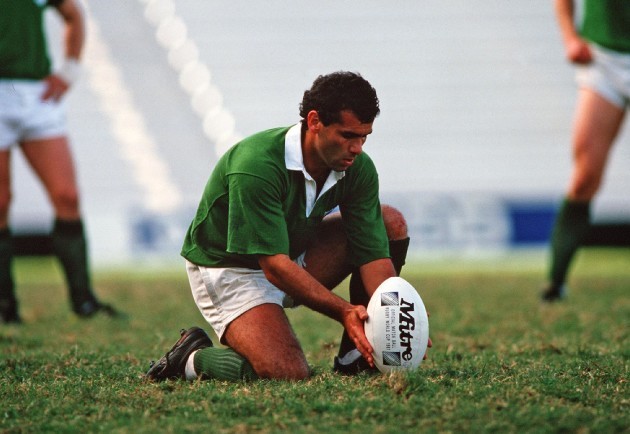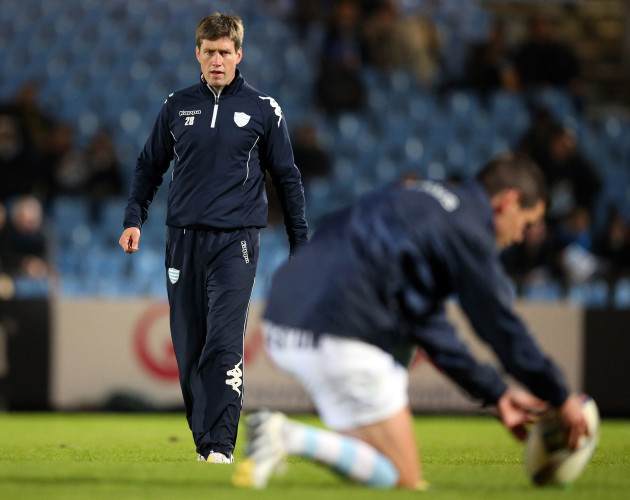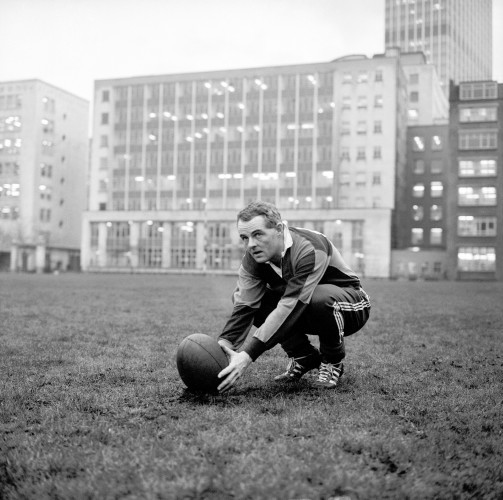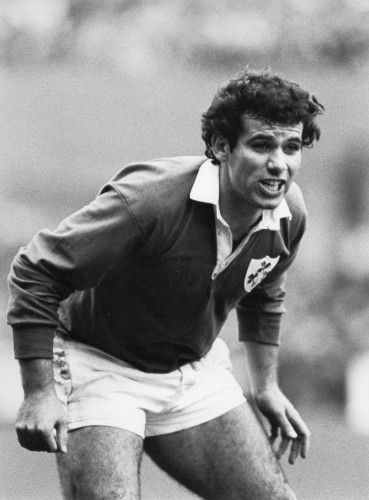YOU COULD CHAT from now ’til 2016 about the list of rugby players who have been able to arrive to the game late, but still excel in the field.
In many positions, sheer athleticism and strength can be honed and directed with good coaching to impose expert technique into the mix.
Even right up the professional level, it’s possible for seasoned stars of rugby league to pack their bags and cross codes for a career in union despite the extra set of groundwork skills that must be picked up on the hoof.
Number 10 is different.
If there’s a question mark over whether a player is an out-half, then it’s probably too late. Just cut the losses and slot them in at 9, 12 or 15. It’s either in you or it’s not.
“We’re very lucky, those of us who play out-half,” smiles Tony Ward when he sat down with The42 last month.
As a coach in the south Dublin school of St Gerard’s, it’s part of Ward’s job to identify the talent coming through, and particularly ‘the lucky ones’ who pull the strings.
“You make a mistake, but then you forget about it. because the game is happening so quickly around you – they’re not fazed when they make mistakes.”
Since retirement, Ronan O’Gara has found it easier to express what he sees as a difference between his own position, and the rest. It takes that sort of innate confidence for an out-half to cope with the tonne-weight pressure on their shoulders.
“Jesus, yeah, and especially if you’re a kicker,” O’Gara told Pat McCarry in the book The New Breed.
It’s a team game, but I often say to Johnny [Sexton] and the other players, ‘Every time you take to the pitch, you will be judged and read inside out’. That’s a great responsibility to have – you have a direct influence on the results.
“If you kick poorly you’re probably going to lose, unless the [other] team are also very poor. At the highest level, in professional Test matches, that isn’t the case. That’s something you have to embrace and go for.”
The notion that the responsibility of being ‘the kicker’ must automatically be assigned to the out-half is not uniquely Irish, but it is nonetheless a convention this island often straps itself to far more often than not.
O’Gara points to the pressure he felt when kneeling down to plant the ball for a kick at goal in a packed, yet mostly silent, stadium. But that’s only an added extra to the responsibility of being the chief playmaker, game manager, drop-goal specialist and, usually, the face of the team too.
Why not take something off the 10′s plate? It’s an issue we’ve pondered long before a sub-par day on the tee prompted a contingent of Munster fans to sarcastically applaud their own player off the field early this month.
‘Quite extraordinary’
France do it, with scrum-halves regularly pointing to the posts, Wales fullback Leigh Halfpenny continues in the tradition of Neil Jenkins and Scotland’s Chris Paterson as distinguished goal-kickers among outside backs. And of course both South Africa and Australia have been in World Cup finals this century with non-10s holding the responsibility of keeping the scoreboard ticking over.
“I think you have to go back…” says Ward with gears turning through his Ireland Test memory banks in search of a regular place-kicker who was not first receiver, “probably to Tommy Kiernan. That’s back in the ’60s, early ’70s, which is quite extraordinary.”
It’s understandable that the required skill-set of a game-managing out-half naturally lends itself to accurate kicking from the ground as well as from the hand. It’s just strange that Ireland hasn’t seen an anomaly to the trend in over 42 years.
Geordan Murphy has two Test place kicks to his name, Rob Kearney has a conversion. But when it comes to being a regular goal-kicker, only 10s need apply. That means no shots at goal for Fergus McFadden, Keith Earls or Conor Murray who all acquitted themselves well when handed the tee at age grade.
For Ward, it’s a secondary concern when he’s identifying the talented kids who step up for rugby training.
At schools level, he does not select an out-half on their ability to split the posts, nor does he select a hooker solely on their line-out throwing — he once tasked Peter Bracken with being the primary goal-kicker while the prop was still a juvenile number eight — there are other skills Ward would prefer to promote in his chief playmaker.
“I played with Paul Dean at Mary’s and Deano and I were very different. I would have been a good kicker, Deano was a beautiful distributor.
So as a coach, I don’t look for myself in an out-half, I look for Deano, I look for the link. I often think, ROG didn’t get the credit he deserved as a distributor. He was brilliant at putting players into a hole, I’m sure Brian O’Driscoll would agree.
“He was a beautiful passer off either side, whether it was a floated long pass or a disguised short pass, he was very good at putting guys into the gaps. That would certainly be the type of 10 I would be looking for when I’m looking to spot talent at under 11 or 12.”
It’s possible to become an out-half and make your way in the game, even attempt to emulate O’Gara by directing traffic with a boot from far behind the gain-line. But to really excel, it takes a certain amount of balls to continue to front up as a distributor.
For a myriad of reasons, such a skill-set will usually be present in players of a lighter frame. That’s where the unflappable confidence comes in: in Eddie O’Sullivan’s book Never Die Wondering, he recalls clearly his first encounter with O’Gara and being struck by ‘this cock-sure young fella’.
All positions were not created equally in rugby.
When it comes to the pressure, both physical and mental, that is pent up and ready to rain down on an out-half from opponents and supporters alike, it takes an innate inner self belief to continue to do the right thing, the pro-active thing.
Even after you’ve shanked a kick embarrassingly left of the posts, even after you’ve been unceremoniously dumped on your arse while delaying a pass, ‘the lucky ones’ get back up and set out to get a situation where they can do it all over again.




